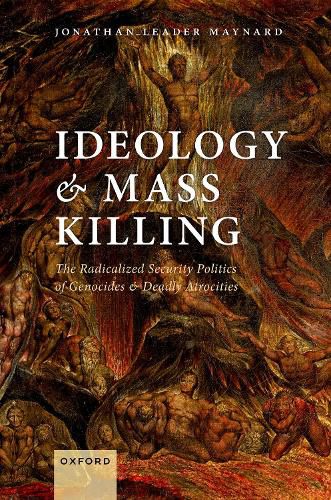Readings Newsletter
Become a Readings Member to make your shopping experience even easier.
Sign in or sign up for free!
You’re not far away from qualifying for FREE standard shipping within Australia
You’ve qualified for FREE standard shipping within Australia
The cart is loading…






In research on ‘mass killings’ such as genocides and campaigns of state terror, the role of ideology is hotly debated. For some scholars, ideologies are crucial in providing the extremist goals and hatreds that motivate ideologically committed people to kill. But many other scholars are sceptical: contending that perpetrators of mass killing rarely seem ideologically committed, and that rational self-interest or powerful forms of social pressure are more important drivers of violence than ideology. In Ideology and Mass Killing, Jonathan Leader Maynard challenges both these prevailing views, advancing an alternative ‘neo-ideological’ perspective which systematically retheorises the key ideological foundations of large-scale violence against civilians. Integrating cutting-edge research from multiple disciplines, including political science, political psychology, history and sociology, Ideology and Mass Killing demonstrates that ideological justifications vitally shape such violence in ways that go beyond deep ideological commitment. Most disturbingly of all, the key ideological foundations of mass killings are found to lie, not in extraordinary political goals or hatreds, but in radicalised versions of those conventional, widely accepted ideas that underpin the politics of security in ordinary societies across the world. This study then substantiates this account by a detailed examination of four contrasting cases of mass killing - Stalinist Repression in the Soviet Union between 1930 and 1938, the Allied Bombing Campaign against Germany and Japan in World War II from 1940 to 1945, mass atrocities in the Guatemalan Civil War between 1978 and 1983, and the Rwandan Genocide in 1994. This represents the first volume to offer a dedicated, comparative theory of ideology’s role in mass killing, while also developing a powerful new account of how ideology affects violence and politics more generally.
$9.00 standard shipping within Australia
FREE standard shipping within Australia for orders over $100.00
Express & International shipping calculated at checkout
In research on ‘mass killings’ such as genocides and campaigns of state terror, the role of ideology is hotly debated. For some scholars, ideologies are crucial in providing the extremist goals and hatreds that motivate ideologically committed people to kill. But many other scholars are sceptical: contending that perpetrators of mass killing rarely seem ideologically committed, and that rational self-interest or powerful forms of social pressure are more important drivers of violence than ideology. In Ideology and Mass Killing, Jonathan Leader Maynard challenges both these prevailing views, advancing an alternative ‘neo-ideological’ perspective which systematically retheorises the key ideological foundations of large-scale violence against civilians. Integrating cutting-edge research from multiple disciplines, including political science, political psychology, history and sociology, Ideology and Mass Killing demonstrates that ideological justifications vitally shape such violence in ways that go beyond deep ideological commitment. Most disturbingly of all, the key ideological foundations of mass killings are found to lie, not in extraordinary political goals or hatreds, but in radicalised versions of those conventional, widely accepted ideas that underpin the politics of security in ordinary societies across the world. This study then substantiates this account by a detailed examination of four contrasting cases of mass killing - Stalinist Repression in the Soviet Union between 1930 and 1938, the Allied Bombing Campaign against Germany and Japan in World War II from 1940 to 1945, mass atrocities in the Guatemalan Civil War between 1978 and 1983, and the Rwandan Genocide in 1994. This represents the first volume to offer a dedicated, comparative theory of ideology’s role in mass killing, while also developing a powerful new account of how ideology affects violence and politics more generally.